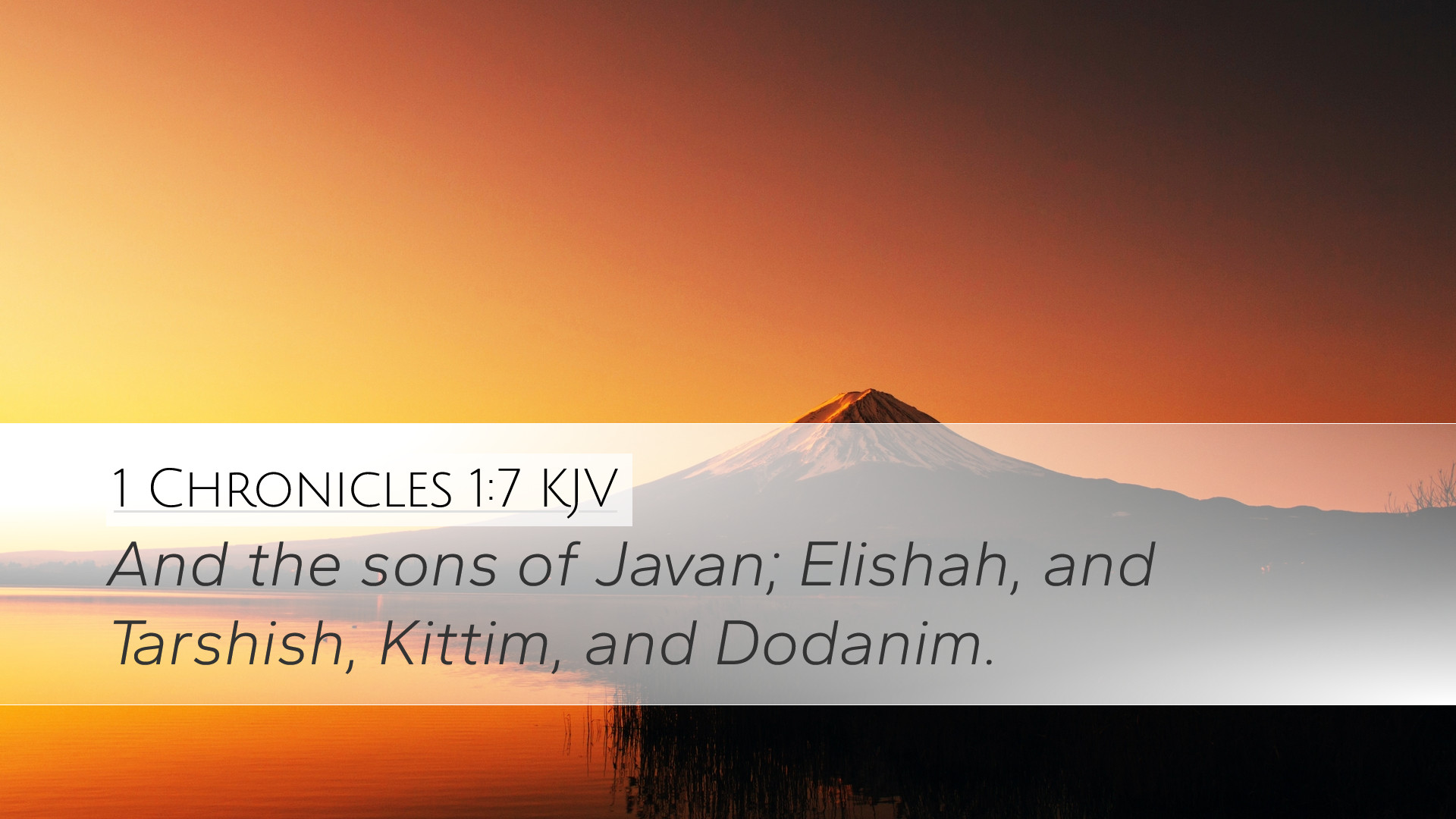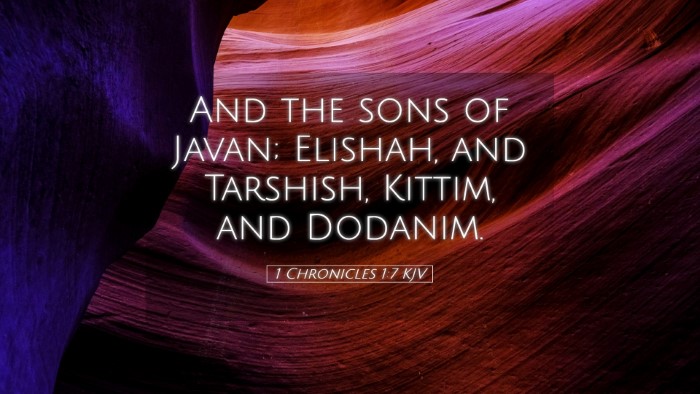Commentary on 1 Chronicles 1:7
Verse Reference: 1 Chronicles 1:7
“The sons of Kusha: Seba, Havilah, Sabtah, Raamah, and Sabtechah. The sons of Raamah: Sheba and Dedan.”
Introduction
This verse encapsulates part of the genealogical records that are a hallmark of the Book of Chronicles. The genealogies serve as a foundation for understanding the historical context of the Israelite people. They are not merely lists but carry theological significance, connecting the present community with their divine purpose and heritage. Drawing from various public domain commentaries, we explore the breadth of meaning behind this lineage.
Genealogical Significance
The genealogies in the Bible serve multiple functions, including providing a historical record, reinforcing the notion of divine promise, and illustrating God's sovereignty over history. In this verse, we see a mention of the sons of Kusha, which connects to broader themes of division and unity among nations.
Insights from Matthew Henry
Matthew Henry emphasizes the importance of recording these genealogies. He asserts that they highlight the fulfillment of divine promises regarding the descendants of Noah. Kusha, as a descendant of Ham, conveys a vital part of the narrative concerning the nations that arose from his lineage. Henry points out that the mention of specific names showcases God's providential design in history, where every individual plays a role in His overarching plan.
Insights from Albert Barnes
Albert Barnes provides a critical examination of the names listed in this verse. He elucidates that the sons of Kusha represent various tribes and nations, indicating the diversity arising from one ancestor. Barnes notes the significance of the names themselves, suggesting that each represents distinct cultural characteristics and contributions to the ancient world. Hence, the verse is not simply a historical note but a testament to God’s diverse creation that encompasses various peoples and tongues.
Insights from Adam Clarke
Adam Clarke expands on the geographical and historical context of the sons of Kusha. He highlights that Kush is often associated with regions of Africa, particularly modern-day Ethiopia and its surrounding areas. Clarke argues that understanding these origins can enrich our comprehension of biblical events and their implications in the ancient Near East. He underscores how these names relate to God's covenant with Noah and the transformative journey of humanity after the flood.
Theological Implications
The mention of Kusha and his sons serves as a reminder of the theological inclusivity that characterizes the biblical narrative. God’s promise to Abraham encompasses not merely one ethnic group but all nations. This inclusivity is visible in the genealogies, which weave a tapestry of humankind's history under divine sovereignty.
- Divine Sovereignty: Each name in this genealogy serves to remind readers that God is in control of history, guiding it toward His purposes.
- Covenant Promises: The lineages speak of the fulfillment of God’s promises to make Abraham the father of many nations, reflecting God’s broader plan of redemption.
- Inclusive Family of God: This verse encourages thoughts about the nature of the Church as the new family of God that transcends ethnic and cultural boundaries.
Practical Applications
The genealogies, though often overlooked, carry practical significance for contemporary believers, illustrating key lessons in faith and community.
Embracing Diversity
As we reflect on the lineage represented in 1 Chronicles 1:7, believers are called to embrace diversity within the body of Christ. Each individual, regardless of background, contributes to the richness of the faith community.
Understanding Heritage
For pastors and theologians, understanding the historical context of their faith is crucial. This verse reminds us of the significance of our spiritual heritage, encouraging a reverence for the journey of God’s people throughout the ages.
Encouraging Unity
As we study these genealogical records, we are reminded of the unity that exists among believers. Just as the descendants of Kusha may have been diverse, the Church today is called to unity amidst diversity, reflecting the inclusive nature of God’s family.
Conclusion
Thus, 1 Chronicles 1:7 serves not merely as a record of genealogical data but as a rich tapestry of theological insights. From the exploration of God’s providence in history to the practical implications for community and inclusion, this verse encourages deeper reflection on the continuity of faith that transcends time and culture. As pastors, students, and scholars engage with these themes, they are invited to perceive the ongoing narrative of God’s interaction with humanity, culminating in the promise of redemption for all nations.


